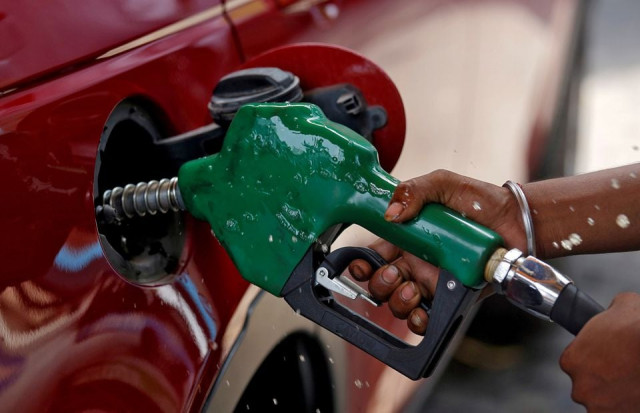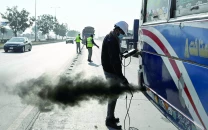POL price hike adds to people’s misery
Govt jacks up petrol price to a whopping Rs18.44; PSX tumbles, rupee continues downward slide

In utter disregard to a growing public discontent over a surging cost of living and inflated power bills, the caretaker government on Tuesday gave in to the International Monetary Fund (IMF) diktat and announced a whopping Rs18.44 per liter increase in the price of petroleum products.
As citizens already grapple with shrinking purchasing power, protests have erupted across cities, with people burning electricity bills and obstructing roads. The decision to raise petrol prices by Rs14.91 per liter and high-speed diesel (HSD) by Rs18.44 per liter threatens to fuel further unrest, as multiple protests are slated in the days ahead.
The shocker came on a day Pakistan Stock Exchange (PSX) shares plummeted by over 1,700 points due to rumors of impending interest rate hikes, economic instability, and the relentless depreciation of the rupee. The currency hit an unprecedented low of Rs305.55 against the US dollar, depreciating by Rs1.50.
Also read: Govt to fulfil obligations to IMF ‘at all costs’: PM
Meanwhile, the per tola price of 24 karat gold surged by Rs3,400 to reach Rs239,800, nearly reaching its peak of Rs240,000 set earlier this year. This surge followed interim Finance Minister Shamshad Akhtar's statement that fiscal constraints prevented the government from providing subsidies.
Among the factors driving these price hikes in petroleum products is the significant depreciation of the rupee against the dollar.
Also read PDM govt leaves behind massive inflation
According to a notification issued by the Finance Division, the price of petrol increased by Rs14.91 to Rs305.36 per litre from the earlier Rs290.45 while that of diesel rose by Rs18.44 to Rs311.84 as compared with Rs293.40 per litre.
The price of both petrol and diesel crossed the Rs300 per litre mark for first time in history.
Diesel is widely used in transport and agriculture sectors. Therefore, a massive increase in its price would have a negative impact on the lives of the masses.
Due to its use in transportation, the transport cost will go up that would result in higher inflationary impact on commodities.
The farmers also use diesel in tractors and therefore, the rise in its prices will also increase their miseries.
Pakistan’s a net importer of petroleum products and any depreciation in the value of the rupee against the dollar had also resulted in the hike in prices of both petrol and diesel that are widely used by the masses.
The prices of kerosene oil and light diesel oil were supposed to be hiked by Rs13.82 per litre and Rs8.66 per litre, respectively. But the government has not been announcing the prices of these petroleum products for the last couple of months.
Therefore, according to the notification issued by the Finance Division, there was no announcement regarding the new rates of these two petroleum products.
The finance ministry in a statement said that owing to the increasing trends of petroleum prices in the international market and exchange rate variation, the government decided to revise the existing consumer prices of petroleum products.
It said that new prices of petroleum products would be effective from Sept 1, 2023.
The government was charging heavy taxes on petroleum products. It was charging petroleum levy on petroleum products up to Rs55 per litre from the oil consumers.
It collected Rs75 billion on account of petroleum levy on petroleum products from the consumers in the month of July.
It was also expecting another Rs75 billion petroleum levy from the consumers during the month of August.
With rise in prices of petroleum products and shortage of dollars in the country, the smuggling of the petroleum products from Iran had witnessed a sharp rise.
The legal oil industry in Pakistan had raised the issue of smuggling with the government several times.
The Petroleum Division had also taken up the matter with the interior ministry and the Federal Board of Revenue to take measures to stop smuggling of petroleum products from Iran. But it still continued that resulted in decline in sale of petroleum products by the local industry.
This means that petroleum dealers have been selling Iranian oil at a price higher than the one notified by the government, oil industry officials said.
According to report, there were 1,500 petrol pumps that were black-listed by the local oil companies but they were storing smuggled Iranian petrol and diesel and also selling to the masses at higher rates.
(With additional input from News Desk)



















COMMENTS
Comments are moderated and generally will be posted if they are on-topic and not abusive.
For more information, please see our Comments FAQ